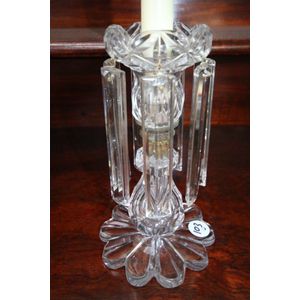Bronze Rams Head Cornucopia Vases with Marble Base
Pair of antique glass cornucopia vases, with cast bronze rams head mount and marble base,one A/F, height 19.5 cm approx
You must be a subscriber, and be logged in to view price and dealer details.
Subscribe Now to view actual auction price for this item
When you subscribe, you have the option of setting the currency in which to display prices to $Au, $US, $NZ or Stg.
This item has been sold, and the description, image and price are for reference purposes only.
- A/f, as Inspected - The letters "A/F" or "as inspected" as part of a description is the cataloguer's shorthand for "all faults" or "as found", meaning the item has some type of damage or deficiency, it is of uncertain date or provenance, and/or that the seller takes no responsibility for the completeness of the item or the accuracy of the description.
- Bronze - An alloy of copper and tin, traditionally in the proportions of about 9 parts of copper to 1 part of tin.
The discovery of bronze in Western Asia in the 4th century enabled people to create metal objects which were superior to those previoulsy possible because of its strength and hardness, and it has been used throughout the world for weapons, coins, tools, statuary and other decorative items.
It is very fluid in a molten state, and its hardness, strength when set, and non-corrosive properties makes it most suitable for casting sculpture. - Cornucopia - The cornucopia, literally the horn of plenty, is a symbol of abundance and wealth. It is traditionally is represented by a curved goat horn overflowing with grain and fruit.
Modern cornucopias are often depicted as horn-shaped baskets filled with food, and this symbol is often associated with the harvest. This decorative device has a long and ancient history, with roots in Greek mythology.
In one version, when Zeus was playing with the goat Amalthea he accidentally broke off one of her horns. To atone for this, Zeus promised Amalthea that the horn would always be full of whatever fruits she desired. This became the cornucopia of the Roman goddess Copia, the personification of plenty. Other goddesses, including Fortuna and Pax, also held the cornucopia.
In furniture and decorative arts, cornucopia as a decorative element have been popular since the 16th century and can be found on items as diverse as light fittings and candelabra to clocks, sculpture and statuary and furniture.
In ceramics, cornucopia shaped vases were popular in the 19th century, in singles and pairs.
This item has been included into following indexes:
Visually similar items

Vaseline glass single trumpet epergne c.1890 (slight nick)
Sold by
in
for
You can display prices in $Au, $US, $NZ or Stg.

Georgian lustre candlestick with prism droppers attributed to John Blades (Ludgate Hill 1783-1829)
Sold by
in
for
You can display prices in $Au, $US, $NZ or Stg.

Pair of tall glass candlesticks glass vase and rams head claret jug tallest 39.5 cm a/f
Sold by
in
for
You can display prices in $Au, $US, $NZ or Stg.

Pair of English brass and iron fire dogs in the form of seated lions, approx 47 cm high (2)
Sold by
in
for
You can display prices in $Au, $US, $NZ or Stg.
